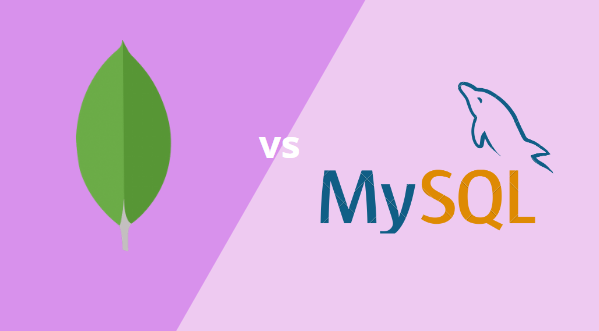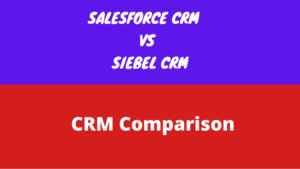Databases have always remained an integral part of enterprise software systems, but the scenario today regarding databases is more vivid. As the technologies are changing, so are the requirements of data storage and management. Given that most businesses thrive on data, using the right one has become more important than ever.
This is where we bring in two renowned names that have been the topic of discussion among developers, MongoDB and My SQL. Both database programs are useful in their own ways, but in order to pick the right one, it becomes important to know the major differences between the two.
This article offers a simple yet informative feature-wise comparison to help you come to a well-deduced conclusion. Let’s begin with what’s what.
MongoDB
MongoDB is a NoSQL, document-oriented, and source-available database program that stores data and represents information as JSON-like documents. This contrasts the table and row formats used by relational database systems. The NoSQL system is preferred by developers because of its flexibility in working with the schema or data structure.
MongoDB makes it easy to work with a large amount of data efficiently. A huge advantage of working with MongoDB is its official support for a wide array of languages including Node.JS, PHP, Python, C, C++, and Swift. Some renowned names that use this database program are Adobe, Facebook, Nokia, and eBay.
MySQL
MySQL is a relational database management system that is extensively used for web applications. This open-source database system is used for carrying out data functions like sorting, grouping, querying, filtering, and joining tables.
Also read:- Robotics And Their Future Impact On Humans
Since related tables and databases fall under the main parts of several websites, MySQL becomes the preferred choice for web apps and sites, especially social networking sites like Twitter. This RDBMS is also known for its performance, high scalability, and low hardware requirements.
Feature-wise Comparison
If one is to go by their definition, then both MongoDB and My SQL seem quite resourceful, then where does the competition lie, and how does one choose the right one? The feature-based comparison enlisted below shall answer these questions.
1. Database Type
The major difference between the two is their database type. MongoDB is a NoSQL database and MySQL utilizes SQL for working with databases. As a NoSQL database, MongoDB follows a dynamic schema.
This means that different documents may have different structures but in MySQL, the schema cannot be changed. Also, the documents in MongoDB are self-describing.
2. Representation of Data
As mentioned in their definition, the concerned databases differ in their data representation. In MongoDB, the data is stored in JSON-like documents, but in MySQL, the data is stored in the form of rows and tables.
3. Replication
MongoDB supports replication which makes data duplication and its maintenance easy for developers. Also, replication helps in speedy data recovery in case of emergency.
MySQL’s replication however is not as efficient as MongoDB’s although it does support master-master and master-slave replication, sharding is not supported by it though it does provide access to associated data by the use of joins.
4. Scalability
Scalability is an integral part of any database system. As the traffic keeps growing, so does the amount of data. A good database system, therefore, should be able to meet this criterion and thankfully, both MySQL and MongoDB do.
MySQL database can be scaled vertically through a process called clustering while MongoDB can be scaled both vertically and horizontally. It also uses a process called sharding that enables data allocation across multiple machines and helps with the deployment of large data sets.
5. Use of Foreign Keys
MySQL supports the use of foreign keys but MongoDB doesn’t. This means that in MySQL, data stored in different tables can be linked via references, which are created with the Foreign Key constraint.
6. Flexibility
When it comes to flexibility, MongoDB surely has the upper hand. The JSON-like documents of MongoDB have optional schemas which make for dynamic modification of schema. It also becomes easy for developers to enhance their apps without going through an extensive schema migration process in contrast with the RDBMS.
The schemas in MySQL databases have a rigid structure. The tables, columns, and rows must be clearly defined. This also means that the development, deployment, and migration process are slowed.
7. Security
In terms of security, both database programs give tough competition to each other. Both MongoDB and MySQL utilize the same encryption technique along with an authentication model.
MongoDB’s access model is a role-based one where users are assigned roles which in turn are responsible for granting them specific permissions. It also uses additional security like SSL. In MySQL, users are granted roles along with privileges that give them permission to perform operations against a particular data set.
Also read:- write for us tech
Also read:- Technology write for us
Also read:- write for us technology blogs
However, MySQL services often follow tighter security measures because it is subjected to SQL injection attacks, which is not the case with MongoDB.
Final Thoughts
We have covered the major differences between the two major database systems. But it’s important to mention that these two technologies have a few things in common like they are both open-source, support cross-platform development, and offer driver support for some of the most popular coding languages.
However, the decision of whether to go for MongoDB database design and development services or to stick with MySQL services depends mostly upon the requirements of the app in question.
Until and unless you are an expert yourself, the wisest thing to do is to get some advice from the experts who can give you detailed information and suggest you the right technology based on your needs.
Author bio:
Hello, I am a professional SEO Expert & Write for us Technology blog and submit a guest posts on different platforms- we provides a good opportunity for content writers to submit guest posts on our website. We frequently highlight and tend to showcase guests.




